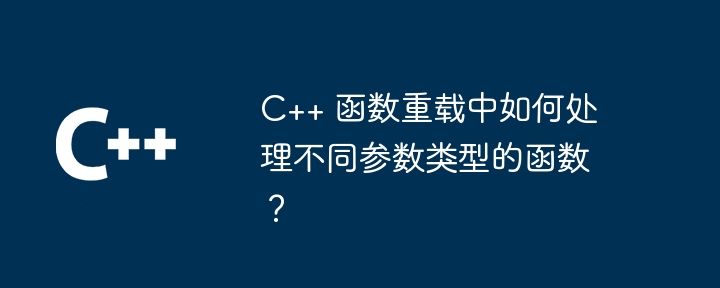
C Function overloading allows different function parameters with the same name: different parameter lists (type, number, order) and return types can be the same or different. When dealing with functions of different parameter types, the compiler uses parameter deduction and type conversion to determine the overload to be called. function.

In C, function overloading allows us to have multiple functions with the same name but different parameters. When a function is called, the compiler determines which overloaded function to call based on the parameter types.
Rules for function overloading:
Handling functions with different parameter types:
When processing functions with different parameter types, compile The compiler uses parameter deduction and type conversion to determine which overloaded function to call.
Practical case:
The following code shows how to handle function overloading with different parameter types:
#include <iostream>
using namespace std;
// 字符串反转
void reverse(string& str) {
reverse(str.begin(), str.end());
}
// 数组反转
void reverse(int* array, int size) {
for (int i = 0; i < size / 2; i++) {
swap(array[i], array[size - i - 1]);
}
}
int main() {
// 将字符串反转
string str = "Hello";
reverse(str);
cout << "反转后的字符串:" << str << endl;
// 将数组反转
int array[] = {1, 2, 3, 4, 5};
int size = sizeof(array) / sizeof(array[0]);
reverse(array, size);
cout << "反转后的数组:";
for (int i = 0; i < size; i++) {
cout << array[i] << " ";
}
return 0;
}In the above example , we created two reverse functions:
reverse(string&): Reverse a string reverse (int* array, int size): Reverse a numeric arrayIn the main function, we call the reverse function to reverse Strings and arrays.
Through parameter deduction, the compiler can determine the overloaded function to be called based on the parameter type. For strings, it calls reverse(string&), and for arrays, it calls reverse(int* array, int size).
The above is the detailed content of How to deal with functions of different parameter types in C++ function overloading?. For more information, please follow other related articles on the PHP Chinese website!
 What are the differences between c++ and c language
What are the differences between c++ and c language
 Recommended learning order for c++ and python
Recommended learning order for c++ and python
 Cost-effectiveness analysis of learning python and c++
Cost-effectiveness analysis of learning python and c++
 Is c language the same as c++?
Is c language the same as c++?
 Which is better to learn first, c language or c++?
Which is better to learn first, c language or c++?
 The difference and connection between c language and c++
The difference and connection between c language and c++
 C++ software Chinese change tutorial
C++ software Chinese change tutorial
 Cost-effectiveness analysis of learning python, java and c++
Cost-effectiveness analysis of learning python, java and c++




